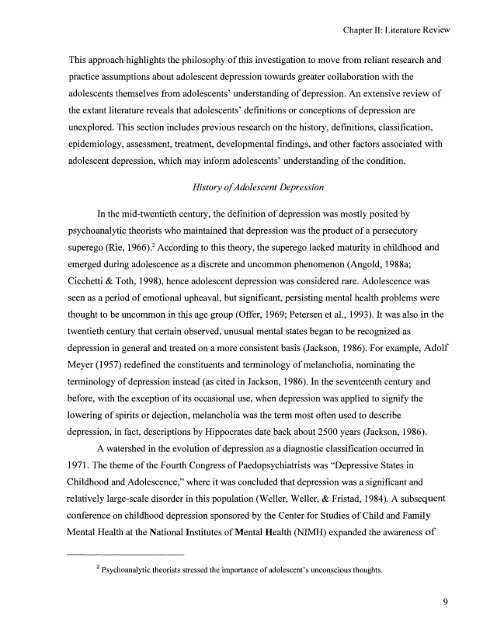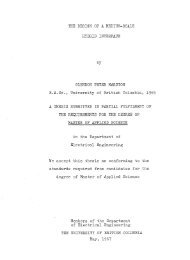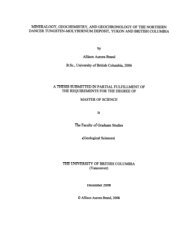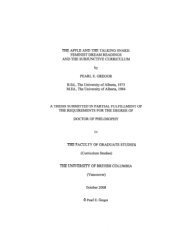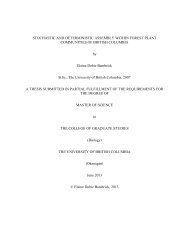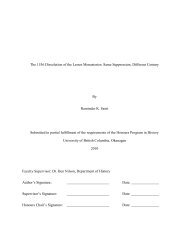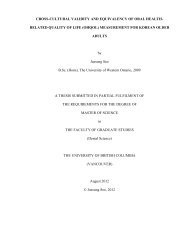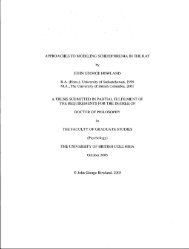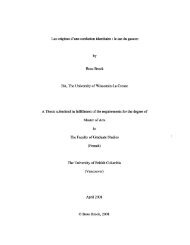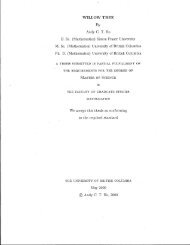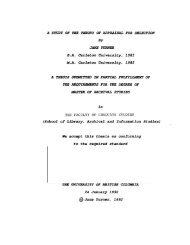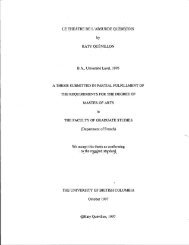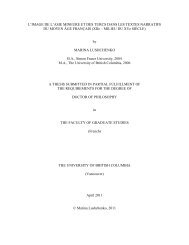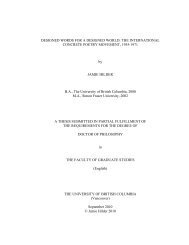how do adolescents define depression? - cIRcle - University of ...
how do adolescents define depression? - cIRcle - University of ...
how do adolescents define depression? - cIRcle - University of ...
Create successful ePaper yourself
Turn your PDF publications into a flip-book with our unique Google optimized e-Paper software.
Chapter II: Literature Review<br />
This approach highlights the philosophy <strong>of</strong> this investigation to move from reliant research and<br />
practice assumptions about a<strong>do</strong>lescent <strong>depression</strong> towards greater collaboration with the<br />
a<strong>do</strong>lescents themselves from a<strong>do</strong>lescents' understanding <strong>of</strong> <strong>depression</strong>. An extensive review <strong>of</strong><br />
the extant literature reveals that a<strong>do</strong>lescents' definitions or conceptions <strong>of</strong> <strong>depression</strong> are<br />
unexplored. This section includes previous research on the history, definitions, classification,<br />
epidemiology, assessment, treatment, developmental findings, and other factors associated with<br />
a<strong>do</strong>lescent <strong>depression</strong>, which may inform a<strong>do</strong>lescents' understanding <strong>of</strong> the condition.<br />
History <strong>of</strong> A<strong>do</strong>lescent Depression<br />
In the mid-twentieth century, the definition <strong>of</strong> <strong>depression</strong> was mostly posited by<br />
psychoanalytic theorists who maintained that <strong>depression</strong> was the product <strong>of</strong> a persecutory<br />
superego (Rie, 1966). 2 According to this theory, the superego lacked maturity in childhood and<br />
emerged during a<strong>do</strong>lescence as a discrete and uncommon phenomenon (Angold, 1988a;<br />
Cicchetti & Toth, 1998), hence a<strong>do</strong>lescent <strong>depression</strong> was considered rare. A<strong>do</strong>lescence was<br />
seen as a period <strong>of</strong> emotional upheaval, but significant, persisting mental health problems were<br />
thought to be uncommon in this age group (Offer, 1969; Petersen et al., 1993). It was also in the<br />
twentieth century that certain observed, unusual mental states began to be recognized as<br />
<strong>depression</strong> in general and treated on a more consistent basis (Jackson, 1986). For example, A<strong>do</strong>lf<br />
Meyer (1957) re<strong>define</strong>d the constituents and terminology <strong>of</strong> melancholia, nominating the<br />
terminology <strong>of</strong> <strong>depression</strong> instead (as cited in Jackson, 1986). In the seventeenth century and<br />
before, with the exception <strong>of</strong> its occasional use, when <strong>depression</strong> was applied to signify the<br />
lowering <strong>of</strong> spirits or dejection, melancholia was the term most <strong>of</strong>ten used to describe<br />
<strong>depression</strong>, in fact, descriptions by Hippocrates date back about 2500 years (Jackson, 1986).<br />
A watershed in the evolution <strong>of</strong> <strong>depression</strong> as a diagnostic classification occurred in<br />
1971. The theme <strong>of</strong> the Fourth Congress <strong>of</strong> Pae<strong>do</strong>psychiatrists was "Depressive States in<br />
Childhood and A<strong>do</strong>lescence," where it was concluded that <strong>depression</strong> was a significant and<br />
relatively large-scale disorder in this population (Weller, Weller, & Fristad, 1984). A subsequent<br />
conference on childhood <strong>depression</strong> sponsored by the Center for Studies <strong>of</strong> Child and Family<br />
Mental Health at the National Institutes <strong>of</strong> Mental Health (NIMH) expanded the awareness <strong>of</strong><br />
2 Psychoanalytic theorists stressed the importance <strong>of</strong> a<strong>do</strong>lescent's unconscious thoughts.<br />
9


